Sweden Is Morphing Into Prison For Muslims – Iranian Official
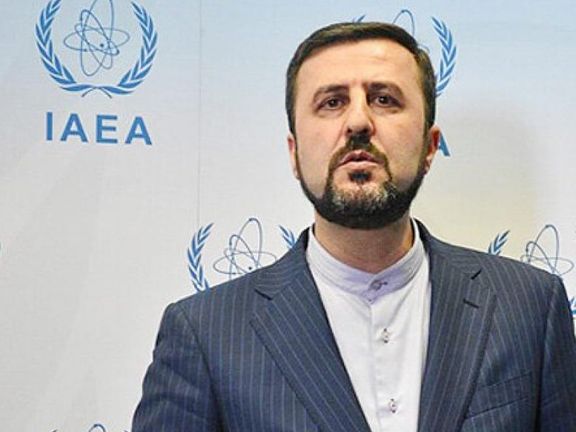
A senior Iranian human rights official has alleged Sweden is morphing into a prison for Muslims with the support of its government.

A senior Iranian human rights official has alleged Sweden is morphing into a prison for Muslims with the support of its government.
In a post on his twitter page on Tuesday, Kazem Gharibabadi, a senior Judiciary official and secretary of Iran’s High Council for Human Rights, claimed there is religious intolerance in Europe, particularly in Sweden.
Noting that “Religious intolerance is raging across Europe”, he said, “Sacrilege to religious sanctities is under no circumstances whatsoever acceptable”.
“Seems they’ve missed Medieval Inquisition!”, he quipped.
The Islamic Republic has been long accused by United Nations experts and human rights organizations of persecuting religious minorities.
On Sunday, Iran’s Foreign Ministry summonedthe Swedish chargé d'affaires to protest the burning of a Quran in Sweden by Rasmus Paludan, the leader of Danish far-right political party Stram Kurs (Hard Line).
Paludan went to an open public space in a heavily Muslim-populated neighborhood on Thursday, put the Quran down on the ground and burned it while ignoring protests from onlookers.
Since Thursday, several cities across Sweden, such as the Stockholm suburb of Rinkeby as well as in the cities -- were scenes of riots by Muslims and violent clashes, with social media videos showing young men smashing windows of police cars and setting them on fire.
Several people from pro-Paludan protesters and counter-protesters as well as police forces have been injured and dozens of arrests were made by the Swedish police that seems to be struggling to control the unrest.

The cost of internet subscription in Iran has gone up by up to 60 percent, limiting access to information and potentially harming million of online businesses..
Internet providers recently increased the cost of their services by between 60 to 100 percent. According to Tehran Municipality's Hamshahri newspaper, only days after the hike in the price of broadband, mobile operators scrapped all six and 12-month subscription packages and have only more expensive 90-day packages on offer now.
The subscription cost increase comes at a time when inflation is around 40 percent and food prices have risen by more than 60 percent in one year. The budget of fixed-income Iranians is stretched thin and many have cut down even on food purchases.
Last summer during his election campaign, President Ebrahim Raisi said his government would make broadband free to lower income families but so far has not delivered on the promise. His telecommunications minister, Eisa Zarepour, on March 22 promised adjustments to the cost of broadband would be done with consideration so that it would not add pressure to the other pressures people were under due to the high inflation.
Many also complain that despite higher costs, the speed of broadband has also gone down. Zarepour on Monday admitted that broadband speed in Iran is low due to lack of infrastructure development in the past few years. Iran ranks between 140 to 150 in broadband speed and 70 to 80 in mobile internet speed globally, he said.
Most Iranians use mobile internet rather than broadband. According to the latest figures published by the government, there are 10.6 million broadband and 84.1 million mobile internet subscribers.
Around 1.7 million small businesses, employing 7-8 million people, rely on online commerce, which can decline if internet subscriptions or usage decline.
Some Iranian media, such as conservative Entekhab, have alleged that the hike in the cost of access to the internet may be an attempt to reduce people's access to the internet. Entekhab called the hike the "silent implementation" of Siyanat (Protection) bill. The controversial bill, ironically titled Legislation to Protect Cyberspace Users’ Rights, critics say, is meant to enforce restrictions on the internet and foreign social media platforms.
If passed, the legislation currently under review would require foreign and domestic social-media networks and messaging applications to register with a regulatory and supervisory body that would include representatives of intelligence organizations. The ministry of communications and information technology would be charged with blocking any social networks or messaging applications that failed to gain approval.
Hardliners are adamant the bill should pass the parliament. Ahmad Alamolhoda, a senior firebrand cleric who is Supreme Leader Ali Khamenei's representative in Khorasan-e Razavi Province, on April 8 strongly criticized the parliament for delaying the approval of the controversial bill. "The enemy is at our throat [on social media] and you constantly dilly-dally. What are you waiting for?" he said in his Friday prayer sermon.
Some of the bill’s supporters argue Iran should emulate China's in creating a national intranet. "The Chinese have unique and innovative experience in this field, which we can put to use," lawmaker Ali Yazdikhah said January 18. China uses its ‘Great Firewall,’ a fortified digital border, to manage access to information entering and exiting the country through the Internet.
Iran has been heavily restricting access to the Internet for the past 20 years. Many foreign and Iranian websites, including media websites, are already blocked in Iran although controls are readily sidestepped by VPNs (virtual private networks) and anti-filtering software. While Instagram is the only major social-media platform not blocked in Iran, millions of Iranians use Facebook, Twitter, YouTube, and WhatsApp.

Iran’s traffic police have criticized Iranian automakers for producing low-quality vehicles responsible for a high rate of road accident casualties.
The deputy head of Iran's traffic police Teymour Hosseini said on Monday that the Iranian-manufactured cars increase the number of deadly accidents and cost the country billions of dollars of capital. He blamed the low-quality of these vehicles on government-sanctioned monopoly that local automakers enjoy.
Hosseini added that the quality of Iranian cars have a “galactic” gap with the global standards, saying that it would be "very cost-effective" for the country if the managers and employees of Iran's two largest carmakers just "stay at home".
Hosseini said the era when automakers could make small changes and call the result a new car has long passed.
Many Iranian officials and authorities, including President Ebrahim Raisi, are critical of the local car industry, with pundits blaming a “mafia-like” influential group behind a ban on car imports to eliminate competition.
Traffic police chief Kamal Hadianfar once described Iranian cars as “death wagons”, and criticized manufacturers for importing parts from China, saying there is no effective quality control.
Iran's automotive industry, the county’s largest after oil and gas, employs 700,000 workers.
With around 20,000 annual deaths, Iran has a poor traffic safety record. According to World Health Organization (WHO) data published in 2018, road traffic accident deaths in Iran reached 21,831 or 6.5 percent of all fatalities.
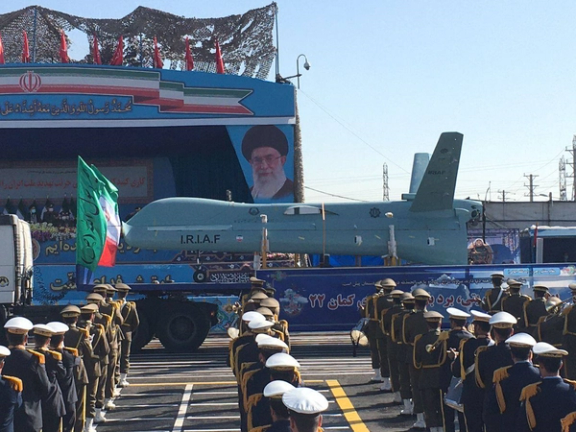
Iran showcased some of its latest drones Monday on Army Day, including the "strategic multi-functional combat drone" Kaman-22 and the single-engine multirole tactical drone Ababil-5.
Kaman-22, unveiled on February 24, 2021, was displayed at the Army Day parade in Tehran. The unmanned combat aerial vehicle is said have a range of around 3,000km (1,900 miles) and carry a 300kg load, flying up to an altitude of 8km with a flight duration of over 24 hours. Ababil-5 is the newest variant of the HESA Ababil family of drones, now equipped with four to six Almas (meaning ‘diamond’) missiles and an aerodynamic body design.
The US and Israel pioneered the use of drones in the Middle East, although China has now become a major supplier, selling to Egypt, Iraq, Saudi Arabia, and the United Arab Emirates. Iran and Turkey have developed indigenous production.
As well as 50 models of drones, tanks and other items, Army Day parade featured radar and missile systems, armored units, helicopters, fighters, air-defense systems, and naval equipment. During the parade, President Ebrahim Raisi warned Israel that Iran would strike back in response to "the slightest move against our nation.”

Two Iranian Christian converts, one in capital Tehran and the other in northern city of Rasht, have begun jail sentences.
Sakineh (Mehri) Behjati was transferred to Lakan Prison in Rasht Saturday after being convicted of “acting against national security” after attending home-based religious meetings and “promoting Zionist Christianity.”
Article 18 website, a London-based organization that says it promotes religious freedom in Iran and operates “under a number of Iranian churches in Europe,” claimed that another Christian convert, identified as 51-year-old Fariba Dalir, began serving a two-year prison sentence in Tehran’s Evin prison Saturday, after being charged with acting against national security through establishing and leading what Article 18 called “an Evangelical Christian church.”
While Iran persecutes followers of the Baja’i religious community and rejects esoteric philosophies and cults, the constitution recognizes Christianity, Zoroastrianism and Judaism – whose members have official representatives in parliament. However, churches that are allowed to operate are ethnic Christian congregations, such as Armenians and Assyrians.
These established churches are discouraged from accepting new members, and there is official suspicion of evangelical, millenarianist Protestant sects that carry out services in Persian. Renouncing Islam is forbidden by Sharia and the punishment could be death, although the government in Iran pursues lesser punishments.
The United Nations Special Rapporteur on the Situation of Human Rights in Iran, Javaid Rehman, said in February that at least 53 Christian converts were arrested in Iran in 2021.
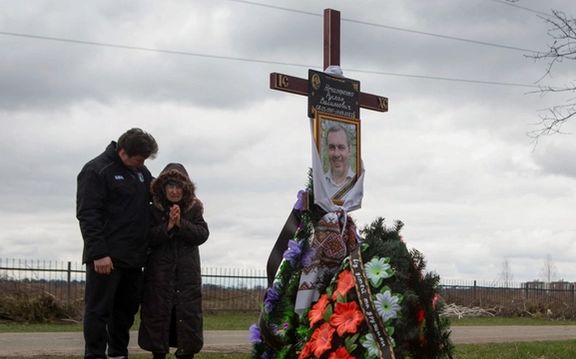
Pro-Russia views about developments in Ukraine appear to be changing in the Iranian media landscape as the Russian invasion drags on with much brutality.
Until last week, Iranian media with very few exceptions across the country's political spectrum echoed the party line about developments in Ukraine, in a probably concerted way based on orders from the Culture Ministry and the Supreme Council of National Security.
This policy highlighted Russian “victories”, promoted Moscow’s propaganda about NATO’s role in the conflict and omitted the word “invasion”.
Over the weekend, two interviews, one with Ukraine's ambassador in Tehran in Asia newspaper, and an interview with a member of Ukrainian Parliament in Etemad Online supported the Ukraine in the conflict while other media outlets, particularly Khamenei-controlled state television continued the usual official rhetoric about Russia trying to purge Ukraine of Nazis and preventing the expansion of NATO.
The state television's coverage of Ukrainian developments has been most annoying for viewers as it constantly portrayed the war as Ukrainians fighting Ukrainians, while the viewers have access to international TV stations which reflect the truth in a variety of different shades.
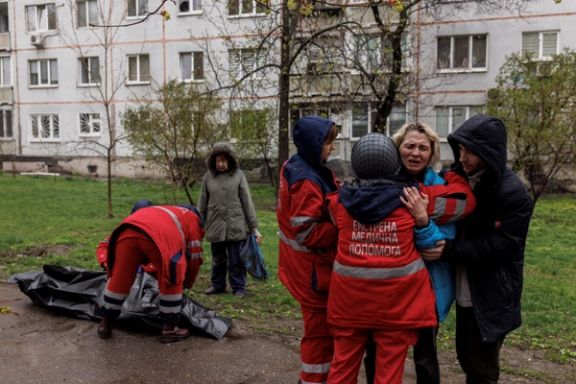
In the interview with Asia, Ukraine's ambassador to Tehran Serhii Burdyliak said that Iran has not helped Ukraine in any way while nearly the rest of the world including Central Asian states have sent financial aid. Some Iranians on social media criticized the ambassador for the remark and lashed out at Ukraine for never saying anything about US sanctions on Iran.
The ambassador further attacked the Iranian government over its stance on the Russian invasion and challenged it to send oil to Ukraine. Both Supreme Leader Ali Khamenei and President Ebrahim Raisi expressed support for Moscow at the start of the conflict in Ukraine.
Meanwhile, reformist Etemad Online quoted a Ukrainian lawmaker as having said that Ukraine will inevitably win the war. The lawmaker added: "We believe that the situation will improve if the Iranian government supports Ukraine and changes its rhetoric about the war in Ukraine."
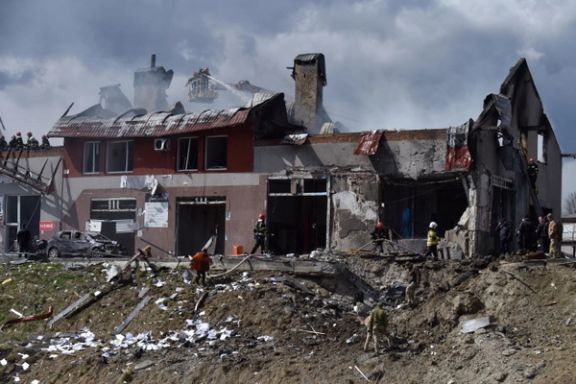
The lawmaker, identified only as “Andrey”, said he did not know whether any Iranians are fighting on the Ukrainian side, while adding "it was quite possible." He probably was countering rumors about Iranians helping Russia in the war against Ukraine.
The Iran Diplomacy website which is close to the Iranian Foreign Ministry observed in an analysis published on April 16 that opposing views in Iran regarding the war in Ukraine are divided in a diagonally opposite way.
"Although there are opposing views on the matter, it seems that part of the Iranian society which supports Russia in this conflict is a minority," the Iran Diplomacy maintained. The website added that Iranians have traditionally maintained opposing views on developments involving Russia for complicated historic reasons, but the differences between various attitudes about Russia during the current conflict has created a sharper bipolar environment in Iran, which is evident in media reports.
The bipolar situation in the media appears to have spread to Iranian society in general, the article argued. One group supports the idea of Russia being a reliable partner for Iran and another group whose characteristic is a profound distrust of Russia which is rooted in Iran's modern history.
The article further argued that some Iranians seriously believe that alliance with Russia under the Islamic Republic has prevented Iran's development while also keeping it apart from western countries.